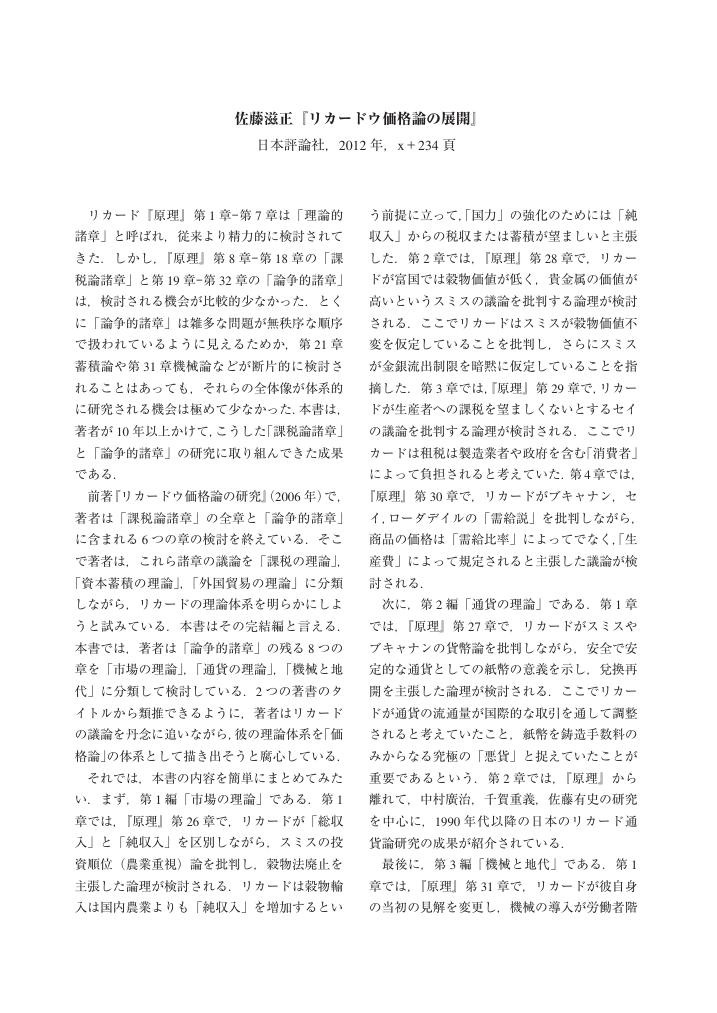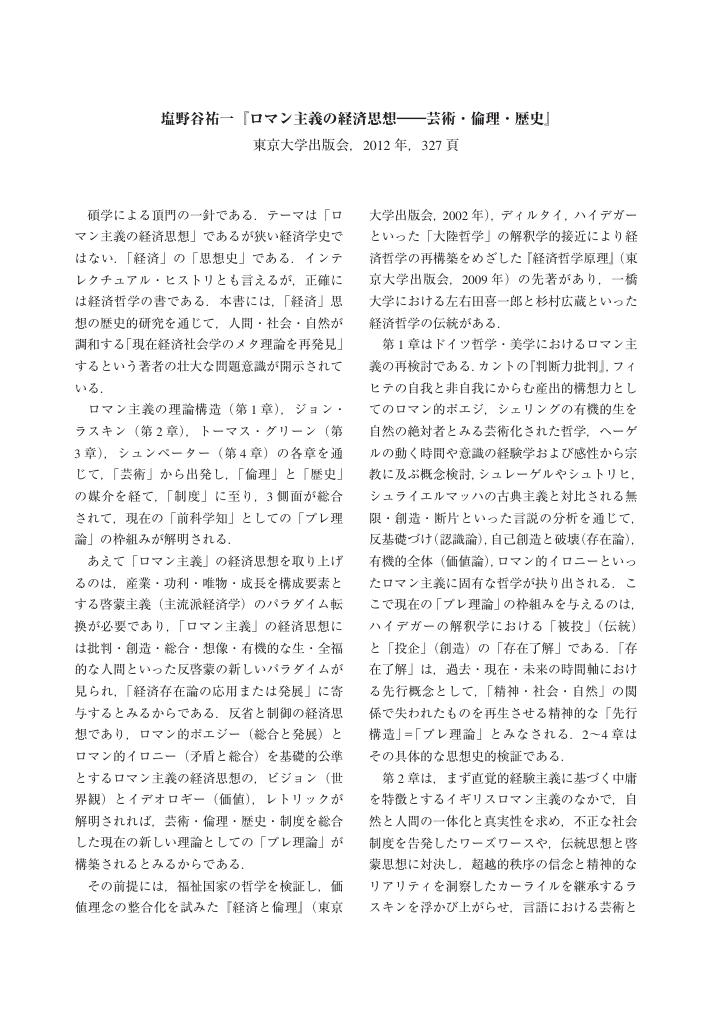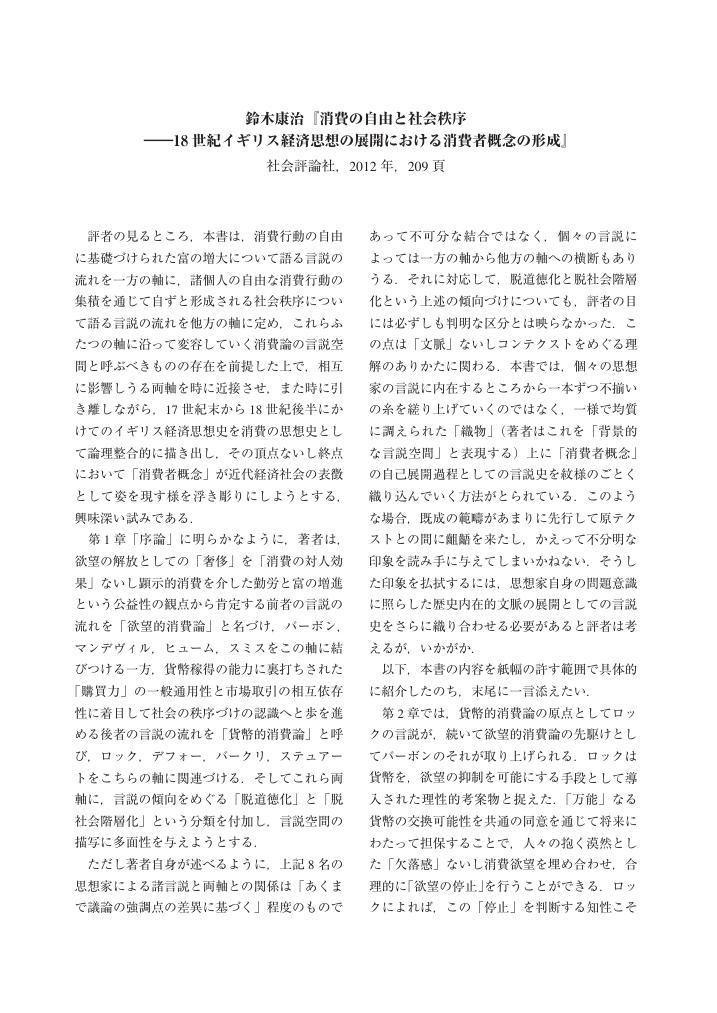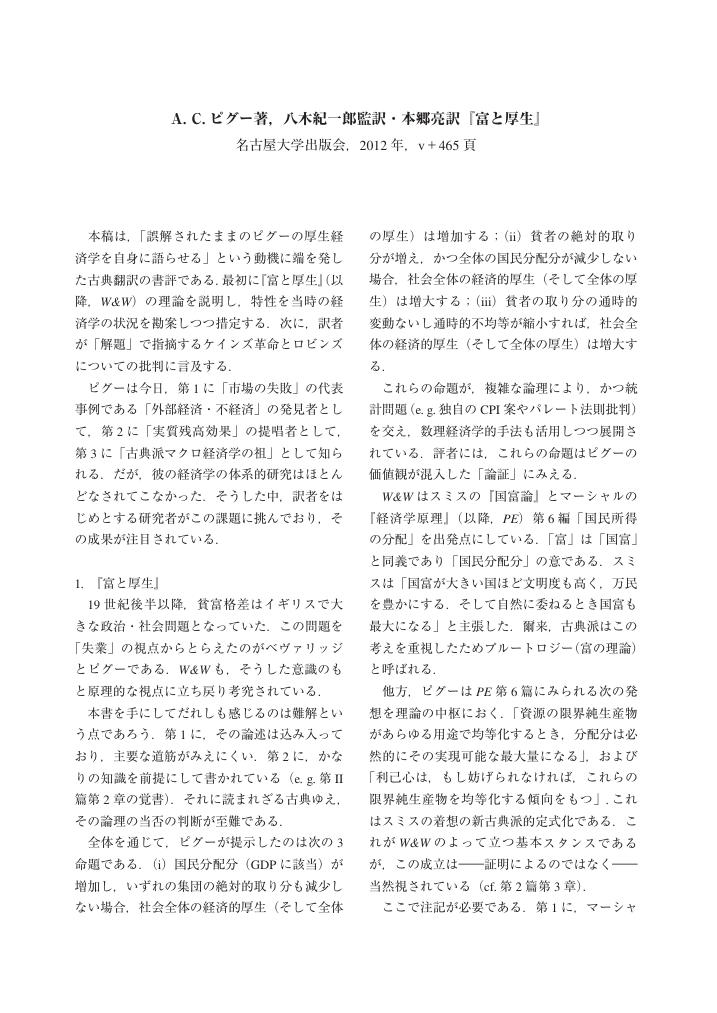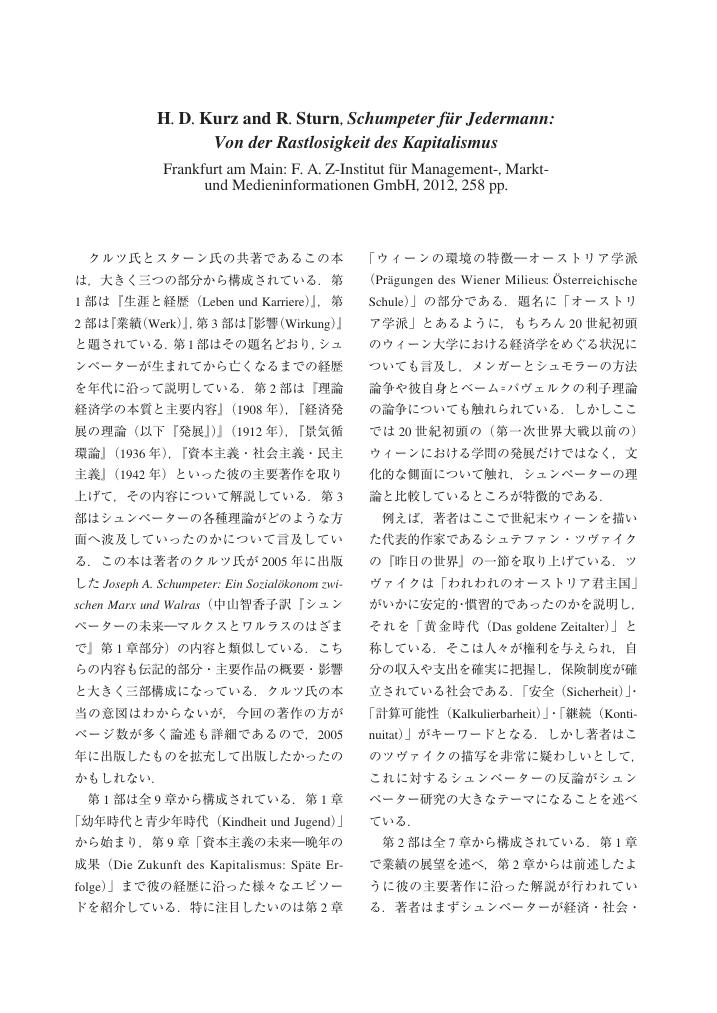- 著者
- 有江 大介
- 出版者
- 経済学史学会
- 雑誌
- 経済学史研究 (ISSN:18803164)
- 巻号頁・発行日
- vol.56, no.1, pp.117-121, 2014 (Released:2019-08-24)
- 著者
- 高見 典和
- 出版者
- 経済学史学会
- 雑誌
- 経済学史研究 (ISSN:18803164)
- 巻号頁・発行日
- vol.56, no.1, pp.126-128, 2014 (Released:2019-08-24)
- 著者
- 久保 真
- 出版者
- 経済学史学会
- 雑誌
- 経済学史研究 (ISSN:18803164)
- 巻号頁・発行日
- vol.55, no.2, pp.126-127, 2014 (Released:2019-11-28)
1 0 0 0 OA 佐藤滋正『リカードウ価格論の展開』日本評論社,2012年,x+234頁
- 著者
- 福田 Shinji
- 出版者
- 経済学史学会
- 雑誌
- 経済学史研究 (ISSN:18803164)
- 巻号頁・発行日
- vol.55, no.2, pp.128-129, 2014 (Released:2019-11-28)
- 著者
- 姫野 順一
- 出版者
- 経済学史学会
- 雑誌
- 経済学史研究 (ISSN:18803164)
- 巻号頁・発行日
- vol.55, no.2, pp.130-131, 2014 (Released:2019-11-28)
- 著者
- 林 直樹
- 出版者
- 経済学史学会
- 雑誌
- 経済学史研究 (ISSN:18803164)
- 巻号頁・発行日
- vol.55, no.2, pp.132-133, 2014 (Released:2019-11-28)
- 著者
- 平井 俊顕
- 出版者
- 経済学史学会
- 雑誌
- 経済学史研究 (ISSN:18803164)
- 巻号頁・発行日
- vol.55, no.2, pp.134-136, 2014 (Released:2019-11-28)
- 参考文献数
- 2
1 0 0 0 OA D. ヒュームの租税・公債論と社会秩序論の展開
- 著者
- 川脇 慎也
- 出版者
- 経済学史学会
- 雑誌
- 経済学史研究 (ISSN:18803164)
- 巻号頁・発行日
- vol.55, no.2, pp.92-105, 2014 (Released:2019-08-23)
This paper explores why Hume wrote essays on tax and public credit in his Political Discourses, in light of the conclusion of his A Treatise of Human Nature. In the Treatise, Hume reached the conclusion that a stable government is need-ed to maintain the stability of the society, which is likely to be diminished by the various kinds of self-interest of its members. According to his es-say on public credit in the Discourses, the Brit-ish government suffered its public finance crisis due to struggles among political parties and the prevailing policies governing the international balance of power. He worried that the increasing lack of faith in the British governmentʼs ability to manage public finance would bring about its collapse. Furthermore, he asserted that should the British government fall, civil society would be unable to subsist. Therefore, he suggested ways for the British government to handle and overcome its public finance crisis in his essay on tax. Humeʼs prescription was as follows: The consumption of luxury should be increased, be-cause individuals always seek luxurious goods to gratify their own desires. Moreover, he advo-cated encouraging refinement in the arts and manners, because he perceived that this would decrease the price of luxurious goods and in-crease their consumption and the tax revenue. Thus, Hume considered excise on luxury goods as the best measure for overcoming the crisis. The reason for Hume writing these essays on tax and public debt lay in his belief that the col-lapse of the British government needed to be avoided at all costs, in the interests of maintain-ing social order. JEL classification number: B 12.
1 0 0 0 OA 欧米での科学社会論を用いた経済学史研究
- 著者
- 高見 典和
- 出版者
- 経済学史学会
- 雑誌
- 経済学史研究 (ISSN:18803164)
- 巻号頁・発行日
- vol.55, no.2, pp.109-115, 2014 (Released:2019-08-23)
- 著者
- 武藤 功
- 出版者
- 経済学史学会
- 雑誌
- 経済学史研究 (ISSN:18803164)
- 巻号頁・発行日
- vol.55, no.2, pp.116-117, 2014 (Released:2019-11-28)
- 著者
- 浅田 統一郎
- 出版者
- 経済学史学会
- 雑誌
- 経済学史研究 (ISSN:18803164)
- 巻号頁・発行日
- vol.55, no.2, pp.118-119, 2014 (Released:2019-11-28)
- 著者
- 松山 直樹
- 出版者
- 経済学史学会
- 雑誌
- 経済学史研究 (ISSN:18803164)
- 巻号頁・発行日
- vol.55, no.2, pp.120-121, 2014 (Released:2019-11-28)
- 著者
- 本吉 祥子
- 出版者
- 経済学史学会
- 雑誌
- 経済学史研究 (ISSN:18803164)
- 巻号頁・発行日
- vol.55, no.2, pp.122-123, 2014 (Released:2019-11-28)
- 被引用文献数
- 1
- 著者
- 川俣 雅弘
- 出版者
- 経済学史学会
- 雑誌
- 経済学史研究 (ISSN:18803164)
- 巻号頁・発行日
- vol.55, no.2, pp.124-125, 2014 (Released:2019-11-28)
1 0 0 0 OA 林直樹『デフォーとイングランド啓蒙』京都大学学術出版会,2012年,vii+308頁
- 著者
- 古家 弘幸
- 出版者
- 経済学史学会
- 雑誌
- 経済学史研究 (ISSN:18803164)
- 巻号頁・発行日
- vol.55, no.1, pp.124-125, 2013 (Released:2019-11-28)
1 0 0 0 OA 古川顕『R. G. ホートレーの経済学』ナカニシヤ出版,2012年,x+268頁
- 著者
- 内藤 敦之
- 出版者
- 経済学史学会
- 雑誌
- 経済学史研究 (ISSN:18803164)
- 巻号頁・発行日
- vol.55, no.1, pp.126-127, 2013 (Released:2019-11-28)
- 著者
- 渡辺 恵一
- 出版者
- 経済学史学会
- 雑誌
- 経済学史研究 (ISSN:18803164)
- 巻号頁・発行日
- vol.55, no.1, pp.128-129, 2013 (Released:2019-11-28)
- 参考文献数
- 5
1 0 0 0 OA ジッド=リストの『経済学説史』 20世紀転換期フランスにおける経済学観の変容
- 著者
- 栗田 啓子
- 出版者
- 経済学史学会
- 雑誌
- 経済学史研究 (ISSN:18803164)
- 巻号頁・発行日
- vol.55, no.2, pp.20-36, 2014 (Released:2019-08-23)
The paper raises two issues: first, it shows unique characters in the history of economic thought in France, and second, it clarifies the disciplinary position of the History of Economic Thought in French higher education at the end of the nineteenth century. Thus, the paper in-tends to define the historical contexts in which the academic discipline of the History of Eco-nomic Thought gained such social and institu-tional significance in France at the time. An examination of the nineteenth-century process of French institutionalization of eco-nomics in higher education demonstrates a rival-ry between the “Grandes Ecoles” and the uni-versities. Classical economics in Say’s tradition dominated the former institutions, excepting a few engineering schools where mathematical economics was introduced. In universities, the course of economics was instead established first in law faculties, and the History of Eco-nomic Thought was introduced as training for law students in economics. Gide and Rist wished to show the students various trends of econom-ics and, for that purpose, published their History of Economic Doctrines as a course textbook. Both authors were Protestants and support-ers of Dreyfus during the famous affair (1894― 1906). They sided more or less with the eco-nomic ideas of Walras and social economics. Their common scientific outlook involved a method of balanced grouping, mapping, and the assessment of various theories by way of inhib-iting a particular inclination to endorse any one of them. This method served their common cen-tral goals of relativizing different theories, and resulted in successful abating of the dominance of classical economics of the time. It was these ideas, in fact, that characterized their works. Fi-nally, their ideas were able to show the signifi-cance of newly emerging trends and theories like mathematical economics and social eco-nomics. JEL classification numbers: B 19, B 31, N 33.





